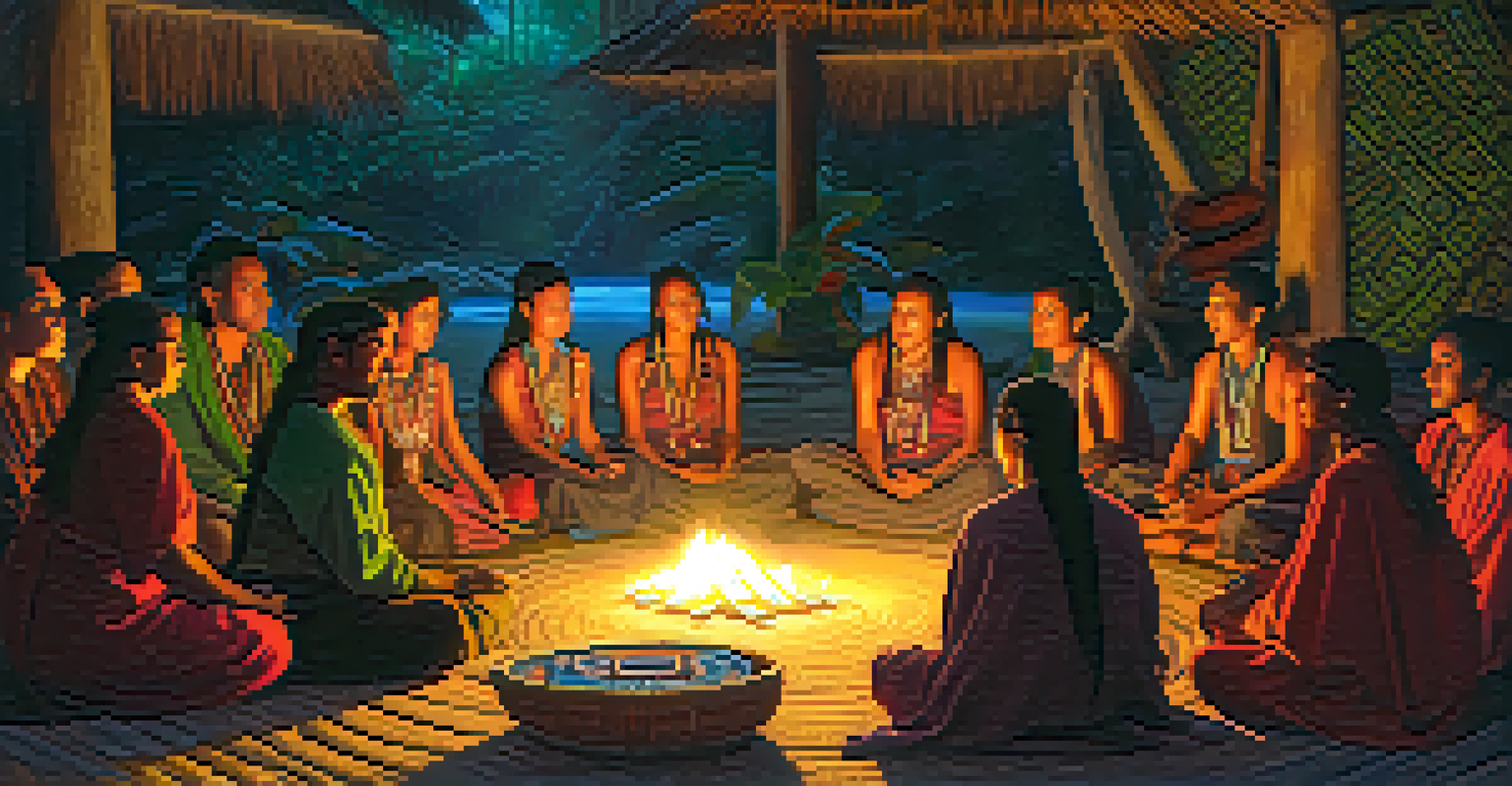Cultural Perspectives on Ayahuasca and Mental Insight

Understanding Ayahuasca: A Cultural Overview
Ayahuasca, a traditional Amazonian brew, has been used for centuries by indigenous tribes for healing and spiritual purposes. This potent mixture, primarily made from the Banisteriopsis caapi vine and the Psychotria viridis leaf, is renowned for its psychoactive properties. It serves as a gateway to profound inner experiences, often described as life-changing by those who partake in its ceremonies. In recent years, ayahuasca has caught the attention of the wider world, leading to a blend of cultural appreciation and curiosity.
Ayahuasca is a tool for self-discovery and healing, but it is essential to approach it with respect and understanding of its cultural roots.
The cultural significance of ayahuasca cannot be overstated. For many indigenous communities, it is not just a substance; it embodies their worldview, spirituality, and connection to nature. Ceremonies often involve a shaman, who guides participants through the experience, ensuring a respectful approach to this sacred rite. This cultural perspective emphasizes the importance of context and intention in the use of ayahuasca, contrasting sharply with its commodification in modern wellness culture.
As ayahuasca journeys gain popularity beyond its native lands, it raises important questions about cultural appropriation and respect for indigenous practices. Understanding its origins helps appreciate the depth of this experience and the wisdom embedded within it. By recognizing and honoring the cultural roots of ayahuasca, we can engage more thoughtfully and meaningfully with its use in a contemporary context.
Ayahuasca and Mental Health: A Therapeutic Lens
Ayahuasca has emerged as a focal point in discussions about alternative mental health treatments. Research suggests that the brew may provide therapeutic benefits, particularly for conditions like depression, anxiety, and PTSD. Many users report experiencing deep emotional releases and insights during their journeys, often leading to transformative personal growth. This has prompted a growing interest in its potential role as a complementary therapy in mental health care.

The active compound in ayahuasca, DMT, is thought to facilitate a unique introspective state, enabling individuals to confront and process unresolved emotions. This introspection can lead to increased self-awareness, helping participants understand the root causes of their mental health struggles. In this way, ayahuasca acts as a catalyst for healing, encouraging individuals to explore their psyche in a supportive environment.
Ayahuasca's Cultural Significance
Ayahuasca embodies the spiritual and healing traditions of indigenous tribes, emphasizing the importance of cultural context in its use.
However, it's crucial to approach ayahuasca as a tool rather than a cure-all. While many have found relief through its use, it is not without risks or contraindications, particularly for those with certain mental health conditions. Therefore, it's essential to seek guidance from experienced practitioners and mental health professionals before embarking on an ayahuasca journey, ensuring a safe and informed experience.
Personal Narratives: Experiences with Ayahuasca
Personal stories often illuminate the profound impact ayahuasca can have on individuals. Many participants recount their journeys as enlightening, where they confront deep-seated fears and traumas. For instance, one individual might emerge from the experience feeling liberated from years of depression, while another may find clarity regarding life decisions that had previously felt overwhelming. These personal narratives highlight the diverse ways ayahuasca can catalyze mental insight.
The experience of ayahuasca can lead to profound insights, but integration of those insights into daily life is vital for lasting change.
Moreover, the communal aspect of ayahuasca ceremonies can foster a sense of connection and shared purpose. Participants often describe feeling a strong bond with others in the circle, which can enhance the overall experience. This communal support can be healing in itself, creating an environment where individuals feel safe to explore their vulnerabilities and insights together.
However, it's important to remember that experiences can vary widely. While some may find profound healing, others might face challenging emotions or difficult revelations. These contrasting experiences underscore the need for a supportive framework, including proper preparation and integration after the journey, to help individuals process what they've encountered.
The Role of Shamans in Ayahuasca Ceremonies
Shamans play a pivotal role in ayahuasca ceremonies, acting as guides through the often intense psychological landscapes participants encounter. Their deep knowledge of the brew, combined with an understanding of spiritual traditions, helps create a safe space for exploration. Shamans often sing icaros, traditional songs that are said to facilitate healing and connection during the experience, adding a layer of spiritual depth to the journey.
The relationship between shaman and participant is built on trust and respect, as the shaman's role is not just to administer the brew but to support individuals throughout their journey. This dynamic can significantly influence the outcomes of the experience, with many participants citing the shaman's wisdom and presence as crucial to their healing. Understanding this relationship helps highlight the importance of cultural context in ayahuasca use.
Therapeutic Potential Explored
Research indicates that ayahuasca may offer therapeutic benefits for mental health conditions like depression and PTSD, acting as a catalyst for personal growth.
As interest in ayahuasca grows globally, it raises ethical considerations regarding the training and practices of shamans. Ensuring that shamans are properly respected and compensated for their knowledge is essential, as is understanding the power dynamics at play. Acknowledging the significance of the shaman's role can lead to more respectful and authentic engagement with this sacred tradition.
Integration: Making Sense of the Ayahuasca Experience
Integration is a crucial aspect of the ayahuasca journey, as it involves processing and applying insights gained during the experience to everyday life. Many participants report feeling a sense of clarity and purpose after their sessions, but translating these revelations into actionable steps can be challenging. Integration practices can include journaling, therapy, or community discussions, which help individuals make sense of their experiences.
Without proper integration, the powerful insights from an ayahuasca journey may fade over time, leading to confusion or disillusionment. Many practitioners emphasize the importance of creating a support system post-ceremony, enabling individuals to share their experiences and navigate challenges. This supportive framework can significantly enhance the benefits of the journey, making it a lasting catalyst for personal growth.
Furthermore, the integration process can foster a deeper understanding of oneself and one’s place in the world. By reflecting on the lessons learned and making conscious choices aligned with these insights, individuals can experience sustained mental and emotional benefits. Thus, integration is not just an afterthought but an essential part of the ayahuasca journey.
Cultural Appropriation vs. Appreciation in Ayahuasca Use
As ayahuasca becomes more popular in Western wellness circles, the line between cultural appropriation and appreciation blurs. Many practitioners advocate for a respectful approach that honors the indigenous roots of ayahuasca while allowing for personal exploration. This involves understanding the cultural significance of the brew and engaging with it in a way that respects its origins and the communities that have used it for generations.
Cultural appropriation occurs when elements of a culture are used outside of their original context, often without acknowledgment or respect for their significance. In the case of ayahuasca, this can manifest as commercialized retreats that overlook the profound spiritual and cultural aspects of the practice. Recognizing this dynamic is crucial for anyone interested in participating in ayahuasca ceremonies, ensuring that their engagement is thoughtful and informed.
Integration is Key Post-Journey
Proper integration of insights gained from ayahuasca experiences is essential for translating revelations into actionable steps in everyday life.
On the other hand, cultural appreciation involves learning about and respecting the traditions and practices associated with ayahuasca. This can include supporting indigenous communities, engaging in educational opportunities, and seeking out authentic experiences led by knowledgeable shamans. By fostering a mindset of appreciation rather than appropriation, participants can contribute to a more respectful dialogue around ayahuasca in the modern world.
The Future of Ayahuasca in Global Mental Health Discourse
The growing interest in ayahuasca as a tool for mental health is reshaping discussions around traditional and alternative therapies. As scientific research continues to explore its therapeutic potential, ayahuasca is gaining recognition in both clinical and holistic health circles. This shift could lead to more integrated approaches that combine traditional wisdom with modern psychological practices, benefiting a broader range of individuals seeking healing.
Moreover, as ayahuasca becomes more mainstream, it is essential to address the ethical considerations that come with it. The commercialization of ayahuasca retreats raises questions about the sustainability of indigenous practices and the well-being of local communities. Advocating for ethical tourism, fair compensation for shamans, and respect for cultural traditions will be vital as ayahuasca continues to gain traction globally.

Ultimately, the future of ayahuasca in mental health discourse holds promise for both individuals and communities. By fostering respectful and informed engagement with this ancient practice, we can maximize its potential benefits while honoring its rich cultural heritage. This balanced approach could pave the way for a more inclusive understanding of mental health that embraces diverse healing traditions.